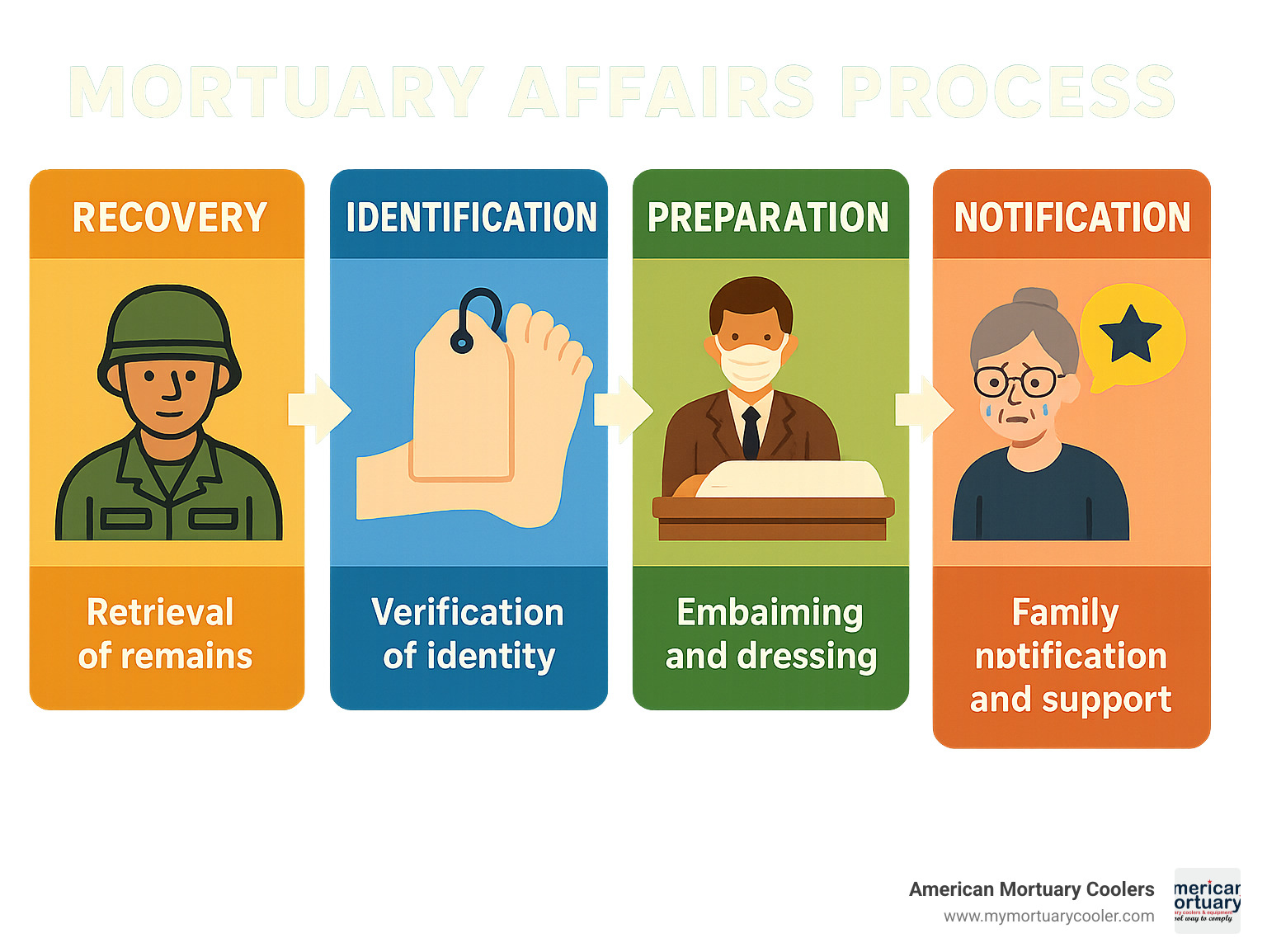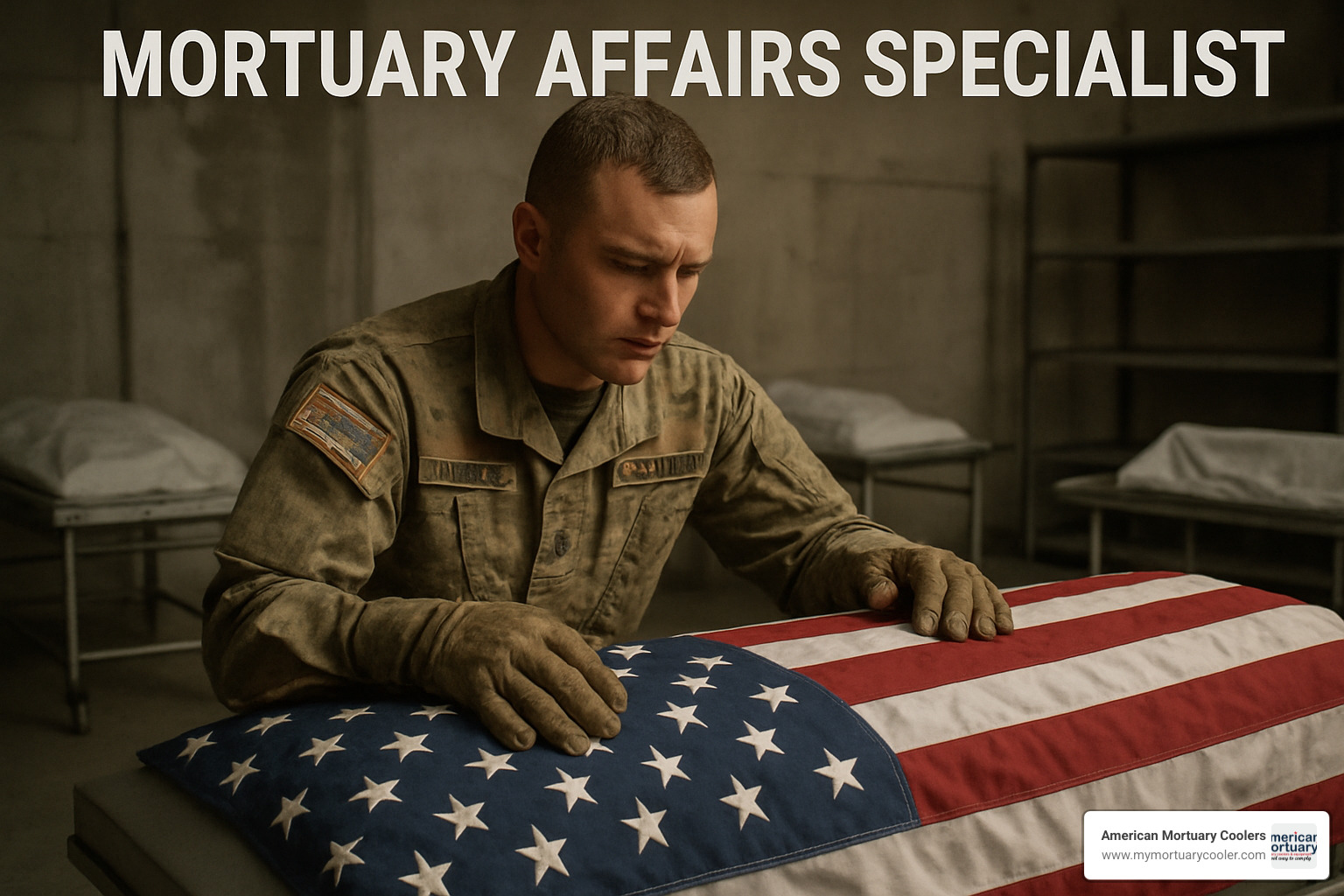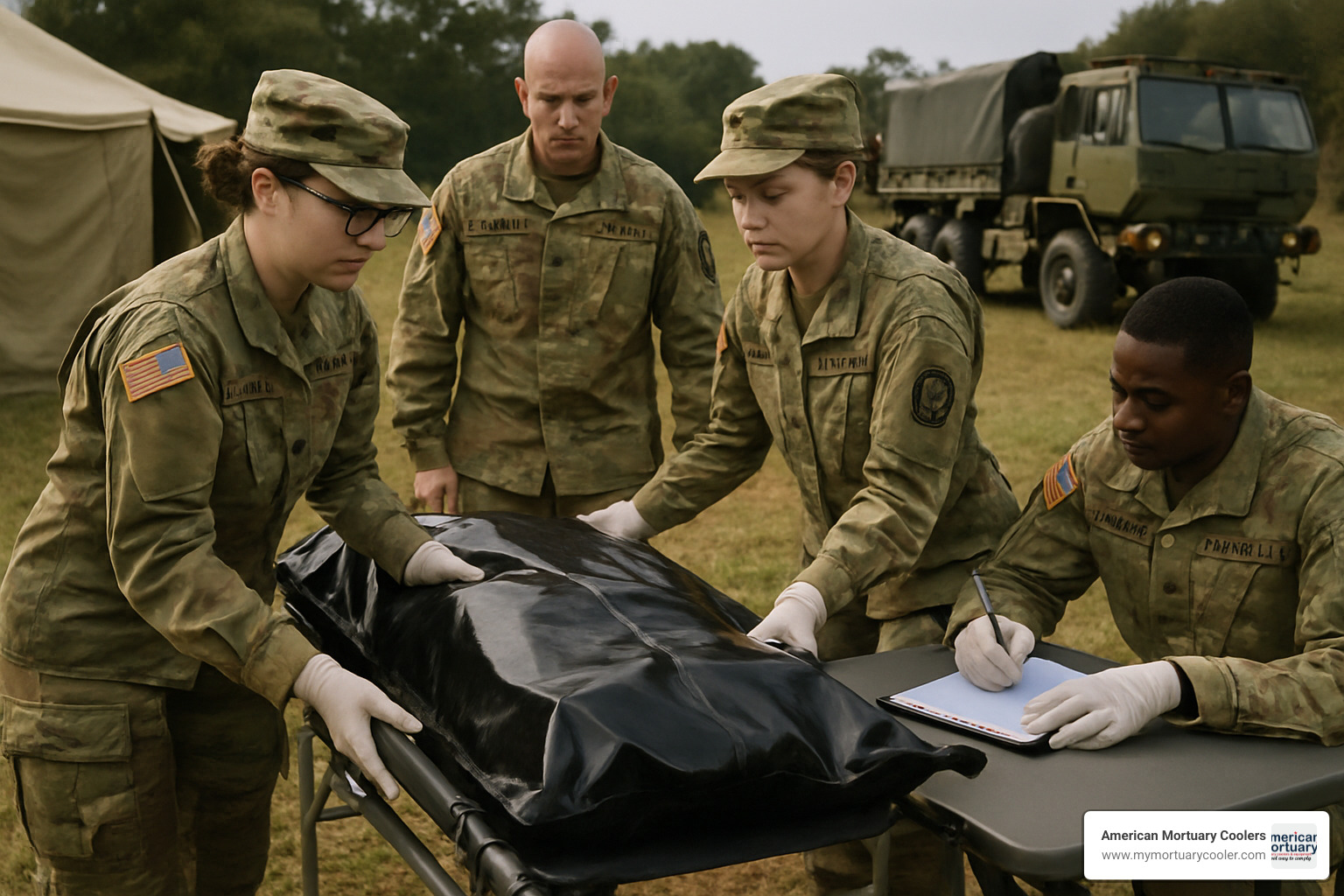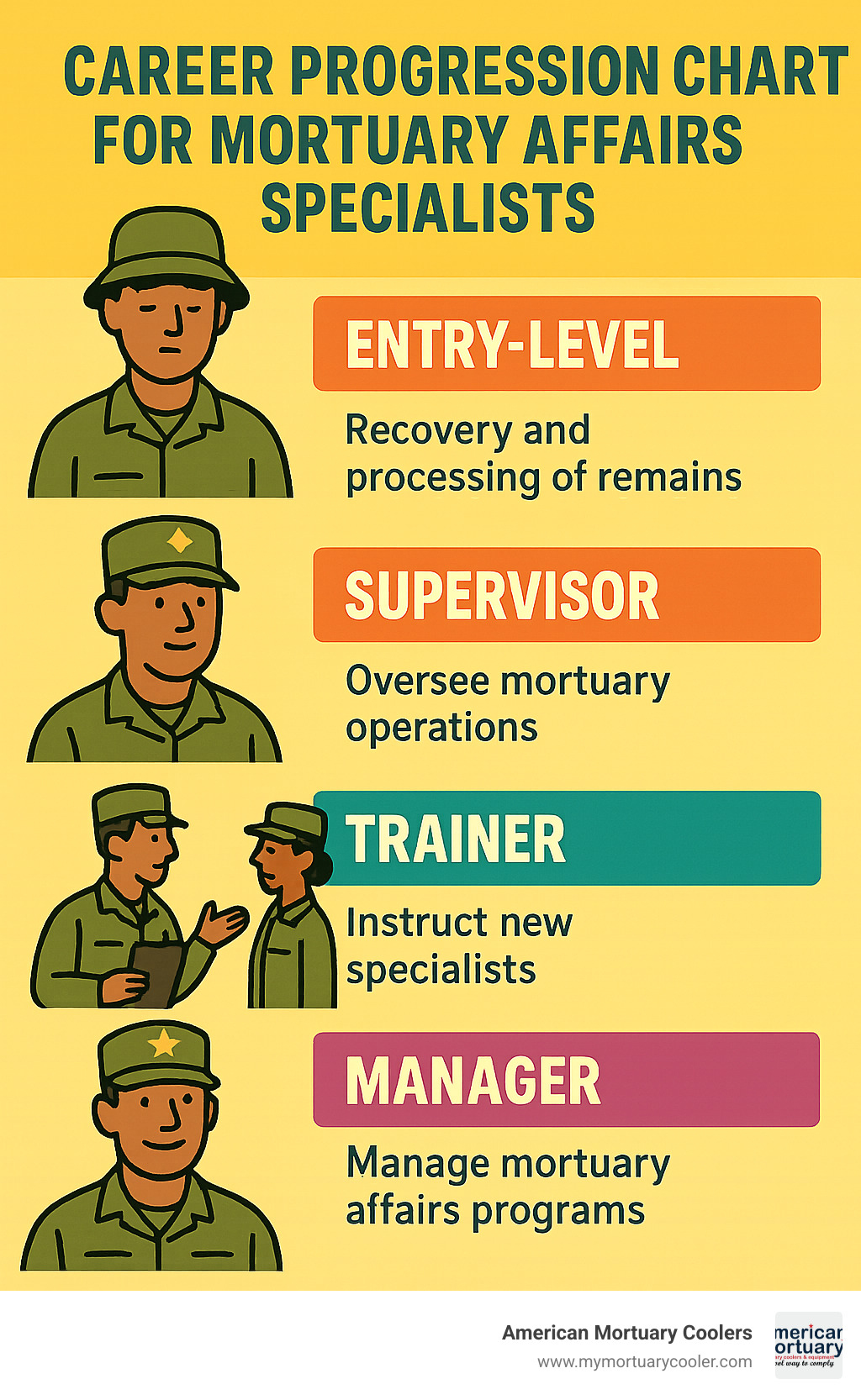The Sacred Duty: Honoring the Fallen with Dignity
A mortuary affairs specialist is a military professional responsible for the recovery, identification, and preparation of deceased service members with dignity and respect. These specialists ensure proper handling of remains and personal effects while supporting grieving families.
Key Facts About Mortuary Affairs Specialists:
- Military occupational specialty code: 92M in the U.S. Army
- Primary duties: Recovery and identification of remains, inventory of personal effects, preparation for transport
- Training: 9 weeks of Basic Training plus 7 weeks of specialized training
- Work environments: Both combat and non-combat situations
- Core values: Dignity, Reverence, Respect (the Mortuary Affairs Creed)
Mortuary affairs specialists serve a crucial role during times of grief, providing families with closure while maintaining the highest standards of care for the fallen. Their work spans from battlefield recovery operations to coordinating funeral services and supporting next of kin.
During the Vietnam War, mortuary affairs specialists achieved a 96% identification rate for Americans killed in action, significantly higher than the 78% rate during both World War II and the Korean War. This improvement reflects the profession's evolution and commitment to returning every service member home.

Mortuary affairs specialist terms explained:
What Does a Mortuary Affairs Specialist (92M) Do?
When you think about military service, certain roles immediately come to mind - infantry, medics, pilots. But there's another group of dedicated professionals working behind the scenes with incredible purpose: mortuary affairs specialists. These remarkable individuals shoulder one of the military's most profound responsibilities, ensuring our fallen heroes return home with the honor they deserve.
Operating under the U.S. Army Quartermaster Corps, these specialists accept a mission few could handle. As one veteran specialist expressed it: "They go where others fear to go. They do things that others will not do. They surround themselves with sorrow, tragedy, and grief, and call it their job."
At the heart of everything mortuary affairs specialists do lies their sacred creed: "Dignity, Reverence, Respect." These aren't just words on paper – they're principles that guide every careful movement, every solemn task, every interaction with the fallen.
Since the Korean War, the military has maintained what's called a concurrent return policy. Rather than temporary battlefield burials (common in earlier wars), this approach ensures fallen service members are immediately repatriated to their families – a powerful statement about our nation's commitment to bringing everyone home.
Research from the Quartermaster Foundation shows how recovery and identification rates have dramatically improved over time, reflecting the dedication these specialists bring to their mission.
Primary Responsibilities & Mission Scope
The work of a mortuary affairs specialist spans four distinct but equally important operational areas:
Combat Recovery represents perhaps the most challenging aspect of their duties. While active fighting continues, these specialists move through dangerous terrain to locate, recover, and tentatively identify fallen service members. This requires not just technical skill but remarkable courage – often working in the same hazardous conditions that claimed the lives they're recovering.
Once combat operations end, specialists transition to Post-Combat Recovery, conducting methodical searches across former battlefields. This painstaking work ensures no one is left behind, and may continue for years after the conflict officially ends.
Within established zones, specialists manage Theater Recovery operations, creating collection points where remains are respectfully processed and prepared for their journey home. These temporary facilities serve as crucial waypoints before transfer to permanent facilities like Dover Air Force Base's Charles C. Carson Center.
Some specialists find their calling in Historical Recovery, partnering with the Defense POW/MIA Accounting Agency (DPAA) to locate and identify service members from conflicts dating back generations.
The Evolution of Mortuary Affairs in the U.S. Military
The roots of today's mortuary affairs program stretch back to the Civil War, but it wasn't until World War I that the military formalized these duties by creating the Graves Registration Service (GRS). This marked the beginning of dedicated units focused specifically on caring for the fallen.
World War II tested these units on an unprecedented scale. GRS personnel handled the remains of over 281,000 U.S. service members across multiple theaters of war. Despite their dedication, identification technology limitations meant only about 78% of Americans killed in action were recovered and positively identified.
The Korean War maintained a similar identification rate, but introduced the concurrent return policy that fundamentally changed how America brings its fallen home.
Vietnam represented a turning point in the profession. Through improved techniques, better record-keeping, and forensic advancements, mortuary affairs specialists achieved a remarkable 96% identification rate – setting a new standard that continues today.
Modern mortuary affairs operations center around the 54th and 111th Quartermaster Companies – the only standing, permanent mortuary affairs units in the U.S. military. Based at Fort Gregg-Adams (formerly Fort Lee), Virginia, these units deploy worldwide and train additional personnel when missions demand it.
As the historical overview shows, mortuary affairs has evolved dramatically over decades, but one thing remains constant: an unwavering commitment to treating the fallen with the utmost care and respect.
Path to Becoming a Mortuary Affairs Specialist

The journey to becoming a mortuary affairs specialist isn't for everyone. It calls for a special kind of person – someone with both technical aptitude and a compassionate heart. If you're considering this meaningful path, you'll need to meet several requirements and complete specific training.
First, you'll need to qualify for military service. This means being a U.S. citizen or permanent resident, having a high school diploma or GED, falling within the age range (typically 17-35), and passing a medical exam. The Armed Services Vocational Aptitude Battery (ASVAB) is your next hurdle, where you'll need to demonstrate competence in administrative and technical areas.
Once you've cleared these initial requirements, your training begins with 9-week Basic Combat Training (BCT), where you'll develop fundamental military skills, physical fitness, and discipline. But it's the next phase that sets you on your specialized path.
Your change into a mortuary affairs specialist truly begins during the 7-week Advanced Individual Training (AIT) at Fort Gregg-Adams in Virginia. Here, the Joint Mortuary Affairs Center will immerse you in every aspect of this solemn profession. You'll learn how to handle remains with dignity, preserve evidence, document personal effects, and support grieving families – all while maintaining your own emotional well-being.
For those interested in deepening their knowledge, civilian education like a Mortuary Science Bachelor's Degree can complement your military training and expand your career options both in and outside the service.
Essential Skills & Personal Attributes
Success in mortuary affairs isn't just about technical know-how – it's about who you are as a person. The most effective mortuary affairs specialists bring a unique blend of qualities to this challenging role.
Attention to detail is non-negotiable. When you're responsible for identifying fallen service members and cataloging their personal effects, even the smallest oversight can have profound consequences for families awaiting closure.
Emotional resilience forms the backbone of this profession. You'll witness scenes that most people never see and carry memories that few can understand. Your ability to process these experiences while maintaining your professionalism is crucial.
Empathy transforms technical work into sacred duty. Behind every recovery mission is a family waiting for answers and a chance to say goodbye. Your compassion helps bridge the gap between military procedures and human needs.
Cultural awareness matters deeply in this role. Different faiths and cultures have specific practices surrounding death, and your knowledge ensures remains are handled appropriately according to these traditions.
Those with strong communication skills excel in mortuary affairs. You'll need to document your work with precision while also speaking with sensitivity to families and command structures alike.
Training Pipeline & Continuing Education
The 7-week AIT at Fort Gregg-Adams is just the beginning of your education as a mortuary affairs specialist. This intensive training covers the fundamentals: fingerprinting for identification, dental charting, CBRN decontamination procedures for contaminated remains, forensic photography, personal effects processing, and proper transportation techniques.
In the field, you'll practice setting up and operating collection points, conducting search and recovery operations, and coordinating with other units and agencies. The training is hands-on and immersive, preparing you for the realities of your mission.
But your learning doesn't stop after graduation. Throughout your career, you'll participate in ongoing training to sharpen your skills and adapt to evolving best practices. Many specialists pursue the A1T Autopsy Technician skill identifier, which equips you to support during mass-casualty events and improves both your military service and future civilian opportunities.
This commitment to ongoing growth ensures that mortuary affairs specialists maintain the highest standards in their sacred mission – bringing America's heroes home to their families with the respect they deserve.
Inside the Life of a Mortuary Affairs Specialist – Work, Gear & Emotional Resilience

Step into a mortuary affairs specialist and you'll find a profession unlike any other – one that blends technical precision with profound compassion. These dedicated professionals work across a remarkable spectrum of environments, from battlefield recovery operations to laboratory settings.
At American Mortuary Coolers, we've had the privilege of working alongside these specialists throughout our service areas in Tennessee, Georgia, Illinois, South Carolina, Texas, California, New York, Pennsylvania, and beyond. These connections have given us a deep appreciation for both the challenges they face and the unwavering dignity with which they approach their sacred duty.
Daily Workflow & Work Environments
The day-to-day reality for a mortuary affairs specialist shifts dramatically depending on their assignment. In combat zones, specialists often begin their day before dawn, moving in small search teams to recover fallen service members. The work is methodical and respectful – each location is carefully documented, each personal effect carefully cataloged.
At forward collection points, these professionals work with quiet efficiency, preparing remains for transport to larger facilities. The environment can be austere – sometimes just a tent with basic equipment – but the standards never waver.
Back at fixed facilities like Dover Port Mortuary, the work becomes more technical. Laboratory procedures include fingerprinting, dental comparisons, and DNA sampling. Administrative tasks multiply as specialists coordinate with multiple agencies to confirm identifications and prepare for final transport.
Perhaps most challenging are the escort duties, where specialists accompany the fallen on their final journey home. They coordinate with local funeral homes, ensure proper military honors, and often provide a steadying presence for grieving families.
Equipment & Technology in the 92M Toolkit
Behind every successful mission is a carefully selected array of specialized equipment. Mortuary affairs specialists rely on tools that balance functionality with respect for the solemn nature of their work.
In the field, recovery teams use human remains pouches designed for different environmental conditions. These aren't just "body bags" – they're engineered for preservation, dignity, and proper transport. Teams carry field documentation kits with weatherproof materials for recording essential information, alongside GPS devices that mark precise recovery locations.
Preservation equipment forms the backbone of mortuary operations. Mortuary coolers like those we provide at American Mortuary Coolers are essential for maintaining remains at appropriate temperatures. Our units are built with military operations in mind – durable, reliable, and capable of functioning in challenging environments.
The identification process relies on increasingly sophisticated technology. Fingerprint kits have evolved from simple ink cards to digital scanning systems. DNA collection has become standard practice, with specialized swabs designed to obtain viable samples even in difficult conditions.
For those interested in learning more about essential equipment in this field, our guide to Essential Mortuary Equipment: A Professional's Guide to Key Funeral Supplies offers additional insights.
Coping with the Emotional Toll
Behind the technical skills and specialized equipment lies the most challenging aspect of being a mortuary affairs specialist – managing the profound emotional impact of the work. Studies consistently show these specialists experience some of the highest rates of post-traumatic stress among military occupations.
The military has recognized this unique challenge and developed multi-layered support systems. Peer support networks connect specialists with others who truly understand their experiences. Military chaplains provide spiritual guidance regardless of religious background, offering perspective during difficult moments.
Regular mental health check-ins have become standard practice, helping identify potential issues before they become overwhelming. Rotation schedules are carefully designed to prevent continuous exposure to traumatic situations, giving specialists necessary mental breaks.
For families navigating the loss of a service member, mortuary affairs specialists often serve as a crucial link to understanding. They provide factual information while showing genuine compassion – a balance explored further in our article on Understanding the Role of Casualty Assistance Officers.
Career Outlook, Advancement & Civilian Transitions

When you've dedicated yourself to honoring the fallen as a mortuary affairs specialist, your career path offers both meaningful progression within military ranks and valuable opportunities in civilian life after service.
Starting out, you'll handle the essential recovery and processing duties that form the backbone of this solemn mission. With experience and demonstrated leadership, you can advance to supervising recovery teams in the field – guiding newer specialists through challenging situations with the wisdom you've gained.
As you rise through the noncommissioned officer ranks, your responsibilities expand to include training the next generation of specialists and managing broader administrative aspects of mortuary operations. For those who develop exceptional technical expertise, the Warrant Officer path (MOS 920A) offers specialized career advancement opportunities.
While military pay follows standard scales based on rank and service time, the total compensation package for mortuary affairs specialists is quite competitive with civilian equivalents. Beyond base pay, specialists receive housing allowances, subsistence benefits, and additional compensation for hazardous duty when applicable.
| Aspect | Military Mortuary Affairs | Civilian Funeral Service |
|---|---|---|
| Base Pay | Based on rank and time in service | $45,000-$75,000 average |
| Benefits | Comprehensive (healthcare, housing allowance, retirement) | Varies by employer |
| Education | Paid training and tuition assistance | Often requires self-funded degree |
| Job Security | High during service commitment | Stable industry demand |
When transitioning to civilian life, the skills you've developed as a mortuary affairs specialist open doors to several rewarding career paths. Many specialists find fulfilling work as funeral directors or embalmers, though additional certification is typically required. Medical examiner's offices often value your experience with remains handling and identification procedures, while disaster response teams benefit from your ability to manage difficult situations with compassion and professionalism.
The GI Bill provides valuable support for further education, with many former specialists pursuing degrees in mortuary science, forensic science, or related fields. The military also facilitates internship opportunities with civilian funeral homes, helping build connections before your transition.
Here at American Mortuary Coolers, we've been fortunate to work with several veterans who served as mortuary affairs specialists. Their deep understanding of proper remains handling and preservation techniques has proven invaluable in helping us design custom coolers that truly meet the needs of funeral professionals across the country.
Long-Term Opportunities & Related Roles
Beyond the standard career progression, your experience as a mortuary affairs specialist can lead to specialized opportunities that combine purpose with professional growth.
The Defense POW/MIA Accounting Agency (DPAA) recovery teams offer particularly meaningful work, traveling worldwide to recover and identify remains of service members from past conflicts. This role blends archaeological techniques, forensic science, and mortuary expertise in service of bringing closure to families who have waited decades for answers.
With additional education in forensic anthropology, you can apply your specialized knowledge to work with skeletal remains, determining identity and circumstances of death. This scientific extension of your military experience combines biology, anthropology, and forensic science in fascinating ways.
Civilian medical examiner and coroner offices often actively recruit former mortuary affairs specialists, valuing the unique combination of technical skills and emotional resilience developed during military service. Similarly, organizations like FEMA seek out specialists for disaster response teams, where experience with mass casualty handling becomes invaluable during crisis situations.
Frequently Asked Questions about Mortuary Affairs Specialists

What makes the mortuary affairs specialist mission unique?
When people ask what sets mortuary affairs specialists apart, I always point to the profound sense of purpose that guides their work. Unlike most military roles focused on tactical objectives, these specialists serve as the final guardians for those who've made the ultimate sacrifice.
The heart of their uniqueness lies in the sacred trust placed in their hands. Every action they take is guided by a commitment to ensure fallen service members receive treatment filled with dignity, reverence, and respect—from the moment of recovery until they're returned to their waiting families.
For families experiencing unimaginable loss, the certainty of identification provides a foundation for healing. Mortuary affairs specialists understand this deeply, which is why they employ multiple verification methods and maintain impeccable documentation throughout the process. This attention to detail ensures families can have absolute confidence they're receiving their loved one's remains.
How long is training to become a mortuary affairs specialist?
Becoming a mortuary affairs specialist involves a comprehensive training journey that builds both technical skills and emotional resilience. The formal training begins with a 9-week Basic Combat Training (BCT) course—the same fundamental military training all Army recruits complete, covering everything from physical fitness to basic soldiering skills.
From there, specialists move on to a 7-week Advanced Individual Training (AIT) program at Fort Gregg-Adams in Virginia. During this specialized training, they learn the technical aspects of recovery, identification, and processing remains, along with the equally important skills of supporting bereaved families with compassion and dignity.
Throughout their careers, mortuary affairs specialists participate in ongoing professional development and certification courses. Many pursue specialized credentials like the A1T Autopsy Technician identifier or advanced training in mass casualty response. This commitment to continuous learning ensures they maintain the highest standards in their sacred duty.
What equipment does a mortuary affairs specialist use daily?
The tools of the mortuary affairs specialist trade reflect both the technical and dignified nature of their work. At American Mortuary Coolers, we've had the privilege of supplying some of the essential preservation equipment these dedicated professionals rely on every day.
Mortuary coolers form the backbone of preservation efforts, maintaining remains at a precise 36-39°F to slow decomposition while preserving dignity. We take great pride in crafting custom coolers built to withstand diverse environments, from permanent facilities to field operations where conditions can be unpredictable.
Body lifts play a crucial role in the dignified transfer of remains. These manual or hydraulic devices allow specialists to move the fallen with respect while protecting themselves from physical strain.
Personal protective equipment is essential for safety, with specialists donning gloves, gowns, masks, and other protective gear that safeguard them from biological hazards. Similarly, decontamination kits become vital when handling remains that may have been exposed to chemical, biological, radiological, or nuclear elements.
Documentation supplies—including specialized forms, cameras, and fingerprint kits—help capture the essential information needed for identification. Meanwhile, transport containers like human remains pouches and transfer cases ensure dignified movement through each step of the journey home.
Conclusion
As we've explored mortuary affairs specialists, we've uncovered the profound commitment these dedicated professionals bring to their sacred duty. From World War I battlefields to today's modern conflicts, these specialists have continuously evolved their methods while never wavering from their core mission: ensuring every fallen hero returns home with the dignity they deserve.
The calling to become a mortuary affairs specialist goes far beyond technical training. It requires exceptional emotional resilience and a heartfelt dedication to serving others during life's most painful moments. The unique skills these specialists develop – meticulous attention to detail, genuine compassion, technical precision, and steady leadership – create a foundation that serves them well throughout both military careers and civilian life.
Here at American Mortuary Coolers, we feel a deep connection to the mission of these remarkable individuals. From our home base in Tennessee, we're honored to support mortuary affairs specialists across all 48 contiguous states by crafting durable, custom-designed mortuary coolers that meet their exacting standards. We understand that our equipment plays a small but crucial role in helping these specialists fulfill their solemn promise to the fallen and their families.
For those considering this unique career path, few military occupations offer such meaningful service to fellow service members and their grieving families. While emotionally challenging – sometimes profoundly so – the opportunity to provide certainty, closure and comfort during times of devastating loss creates purpose that many specialists describe as deeply fulfilling.
To those currently serving or who have served as mortuary affairs specialists, we extend our heartfelt gratitude. Your unwavering commitment ensures that service members who made the ultimate sacrifice receive the honor, dignity, and respect they've earned on their final journey home.
If you'd like to learn more about the specialized equipment that supports this vital mission, please visit Your one-stop shop for mortuary coolers. At American Mortuary Coolers, we're proud to deliver custom solutions that honor the fallen by supporting those who care for them with such profound respect.



















